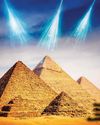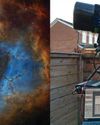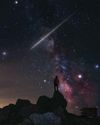
On the date of the June solstice each year (20 or 21 June), thousands gather at Stonehenge in Wiltshire, England to watch the Sun rise just to the left of the Heel Stone. It's a view that humans may have been enjoying for 5,000 years, but there are far more recent constructions that align with the solstices too. Perhaps the most famous is in New York City, where the gridiron layout of its streets means that four times each year, people gather to watch the Sun 'kiss the grid', in what's known - in a tribute to England's neolithic monument - as Manhattanhenge or the Manhattan Solstice.
Manhattanhenge describes four days when either the setting Sun or the rising Sun is aligned with the streets that run east to west in Manhattan. During each one of these events, onlookers stand in the middle of any of the numbered east-to-west streets on the grid and witness - by looking east (for a sunrise) or west (for a sunset) - the Sun sitting on the horizon between the borough's famous skyscrapers.
This story is from the {{IssueName}} edition of {{MagazineName}}.
Start your 7-day Magzter GOLD free trial to access thousands of curated premium stories, and 9,000+ magazines and newspapers.
Already a subscriber ? Sign In
This story is from the {{IssueName}} edition of {{MagazineName}}.
Start your 7-day Magzter GOLD free trial to access thousands of curated premium stories, and 9,000+ magazines and newspapers.
Already a subscriber? Sign In

Putting cosmic rays to work
These penetrating interstellar particles have applications from astronomy to archaeology

Set up your first imaging sequence
How to automate and coordinate your gear over multiple nights of imaging

The Universe without gravity
Life with no gravity might sound a fun idea, but as Govert Schilling explains, shutting off this pivotalforce would spell disaster for Earth and beyond

How to blend images taken with different camera setups
Combine data captured at varied focal lengths to create rich, deep images

INSIDE THE SKY AT NIGHT
Back in September 2021, The Sky at Night show spoke to Carly Howett about NASA's then upcoming Lucy mission. As the spacecraft now approaches its main targets - the Trojan asteroids - we check in with her to see how the mission is going

The science of SCI-FI
We love a good sci-fi film, but do they get the science right? Amy Arthur picks six of the big mistakes made in space films

Seeing in a new light
It's National Astronomy Week this month, so take a tip from Mark Westmoquette and let mindful stargazing change your perspective on your life and problems

What to do if you find a meteorite
Ever come across an unusual rock and wondered if it's a meteorite? Mark McIntyre explains how to tell if that stone really is a fragment from outer space

GEAR
Charlotte Daniels rounds up the latest astronomical accessories

Q&A WITH A STELLAR ECLIPSE SPECIALIST
Many stars are gravitationally locked inside multi-star systems, but a rare new triple-star system has set a new record for how cosy these clusters can get